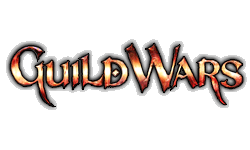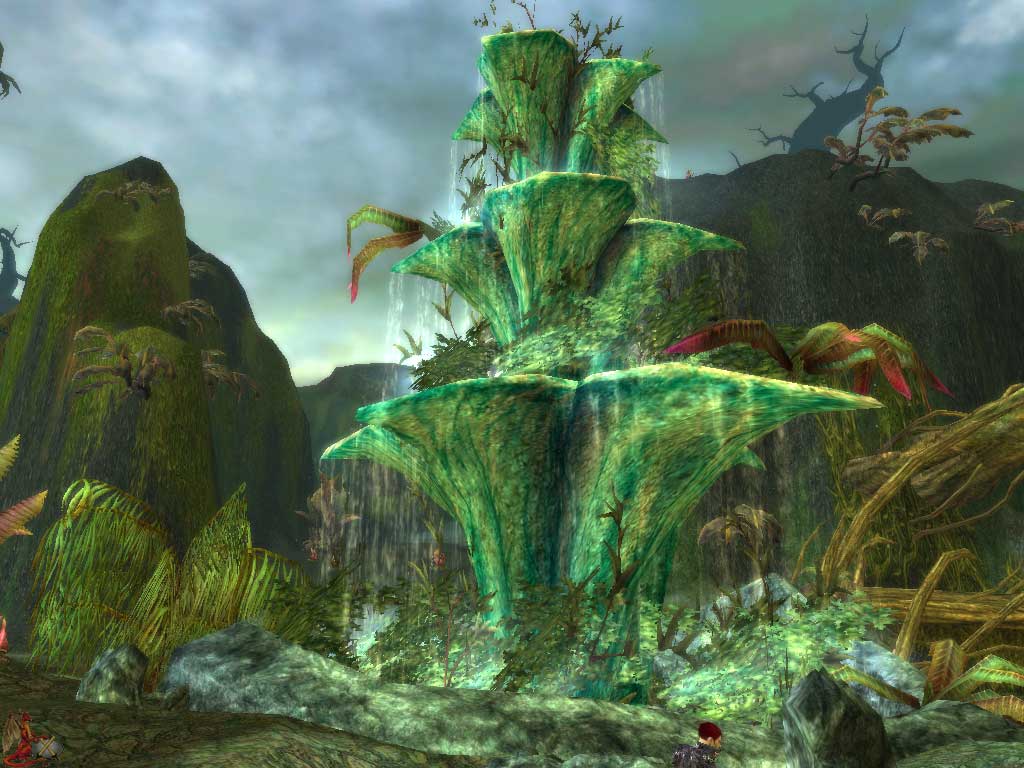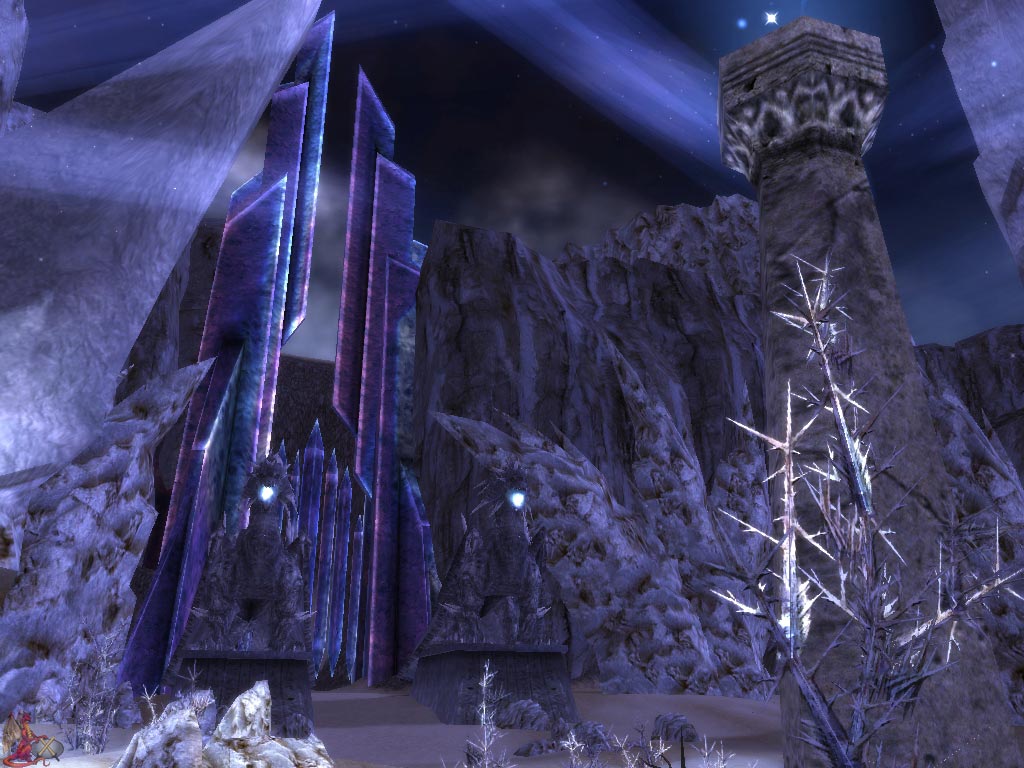|
|

|
BATTLE SYSTEM
|

|
INTERACTION
|

|
ORIGINALITY
|

|
STORY
|

|
MUSIC & SOUND
|

|
VISUALS
|

|
CHALLENGE
|
Medium-Oh My God
|
COMPLETION TIME
|
50-200+ hours
|
|
OVERALL
5.0/5.0
|
Rating definitions
|
|
|
Few MMORPGs on the market live up to their expectations, and even fewer improve exponentially before their release. While some MMORPGs
languish in post-release patches, fixes, and balancing ArenaNet's first MMORPG Guild Wars has proven that not all releases have to be bug-filled exercises in futility. With great character balance, visually amazing graphics, and superb storyline, Guild Wars proves to be the MMORPG that thinks less about how to make a buck and more about how to keep people playing.
The first stop on the review railroad is the always exciting battle system. For many of the latest MMORPG incarnations, the battle
system has seen a gradual change from statistics-based number crunching to skill-based challenges, and Guild Wars is no different. Battles in Guild
Wars, much like other MMOs published by NCsoft, are real-time rock-'em sock'em bash fests complete with failsafe recharge timers and tons of monsters
ganging up. While the player is traveling outside of the town, monsters can come from almost any direction. Scorpion-like Devourers can come from the ground
while other enemies pop up directly in front of the player to either run into or avoid.
Don't expect to see monsters standing around and waiting for players to arrive, however; in Guild Wars, monsters roam, fight, and sometimes even brawl amongst themselves.
Battles themselves tend to err on the side of either tactically brilliant or
mind-numbingly difficult. Tactics can, and often do, play a huge part in battles as every player is only allowed to bring eight of
their skills out of the skill menu and into the battlefield. Players must decide upon which classes to choose early and know which suits them the best. While some player classes prove to be an invaluable aid, others can be overlooked as primary classes and still be useful as secondary ones. Skills are
executed in two ways. The first is to simply click on the skill in the hotkey bar. The second is to press the corresponding number on the player's keyboard after selecting the correct target (healing spells can only target allies, attack magic only enemies).
 Ingame Henge of Denravi
Ingame Henge of Denravi
|
|
If the player is unlucky enough to die, then the classic death penalty will kick in. Don't fret; the method of losing experience or items does not exist in Guild Wars. Instead, the player receives a 15% reduction in life and energy for every death, and multiple deaths can result in a player becoming instantly useless. Thankfully, this extreme penalty can only go as high as 60%, but having a level 20 character with 60% penalty means that player is as useful as a level 8-9 character. Death penalties also reset upon entrance to cities and outposts, but the death penalty still applies when the player is resurrected.
Interaction in the world of Tyria is quite limited, but gamers will still feel involved in the war taking place before them.
Character dialogue from NPCs can expand the story and supply additional information, but most of them simply exist to provide quests and nothing else. The
notable exception to this rule is the gabby, annoying, but awfully adorable Gwen, a character found at the beginning of the game.
The only drawback to interacting with the world is the sometimes dreadful pathing of the character. While moving around her, Gwen can sometimes inadvertently box the player into a corner, effectively preventing escape. Thanks to her exorbitant area of pathing, she can often cause the player to get stuck in an area a normal person could pass. Additionally, other playable characters can sometimes cause this problem in battles and in PVP, making for a very difficult win or a very easy, cheap win depending on whether the two characters involved are on opposite teams. Another notable example of this problem comes in a "protect the hero" PVP mission in which a Ghostly Hero must take his or her place upon a 1x1 area of the map. More often than not, a losing team can and will block that 1x1 area in the name of strategy. This leaves one team with a consistently bitter taste in its mouth as horrible pathing turns into a strategic ploy.
 Feeling a little...blue?
Feeling a little...blue?
|
|
The music of Guild Wars can often be mistaken as not being present; however, the music is there for those who listen, and often fits the world of Tyria wonderfully. Before the burning of the world, Tyria sounds like the beautiful, pristine world one would expect. After, the music becomes more somber, but not to the point of cheesy theatrics. Cinematic music is very present in the final version, unlike beta, and is a most welcome
addition to the formerly silent cutscenes.
Complementing the music are the equally excellent sound effects. Although occasionally loud, they are nicely done and match each and every condition in which they are heard. Firestorm, an Elementalist skill that rains fire from the sky, actually sounds like a rain of fire. The voice acting is nicely done and, unlike most games, sounds like real people speaking; however, the voices that the characters produce in cutscenes often end up more flat than might reasonably be expected, especially when the characters in question are being chased by a horde of monsters.
While the pathing and other areas may suffer small flaws, Guild Wars cannot be faulted for its unique approach. Everything from statistics, to battle execution, to the world itself, is highly innovative, and mostly to the game's advantage. The first truly groundbreaking part of Guild Wars has to be the statistics, which no longer depend on the old staple stats of Vitality, Energy, Dexterity, and others. Instead, ArenaNet has opted out to give players the ability to master specific skill trees such as the Necromancer's Blood Magic. If the player then decides they want to specialize in Death Magic midway through a character's development, ArenaNet has also made a system of Attribute Refund points. These points, earned every mission, allow the player to remove a point from one stat and instantly reassign it to another. These refund points are capped at 24 per character, but gaining them generally comes to be simple by the game's latter stages.
Skills are also handled in a very unorthodox manner. Instead of allowing players to choose from some 80-90 skills per class (150+ for both primary and secondary), they are only allowed to equip up to 8 and may only do so in town. While this may seem like a nuisance, it ends up promoting a more strategic approach to the game--choosing between a healing skill or a damage skill becomes a serious deliberation.
Yet another freshly-conceived idea comes in the form of armor and weapons. Instead of gaining armor through dropped equipment as would be the case in most MMORPGs, mobs in Guild Wars drop crafting materials. From there, the player can go to an armorer and have a specific set of armor crafted. Each set of armor has advantages and disadvantages as well as a unique appearance.
The final, and most noticeable, unique part of Guild Wars is server instancing. ArenaNet planned for the ultimate fix in kill-stealing, looting, player "griefing," and loot arguments, all in one very simple system that will leave most players wondering why it hasn't been done before. Upon stepping outside of town or entering into a storyline mission, players are instantly taken to their own private "instance", into which no one other than the player's party can enter. This eliminates the random kill-stealing that sometimes plagues other MMORPGs and the random PVP that plagues others. Item drops are equally interesting thanks to the item assignment system which assigns an item randomly to a party member when it drops. While this means the player ends up with a wealth of useless items, it also virtually eliminates the always-annoying item looting.
Gold, however, is shared equally among the party, no matter if its members are players or NPC "henchmen."
Usually, at this point in any MMORPG review, there's little to say. MMORPGs are not known for ground-breaking, intense storylines that
progress like any console RPG but Guild Wars is a very hefty exception from the manual all the way until the end. Most striking is the manual, which contains over 60 pages of storyline from the vantage point of three of Tyria's major heroes.
The storyline of Guild Wars itself starts a day before a major war between two powerful nations, Ascalon and the Charr. Players are allowed to see the direct follow-up and the destruction of everything they see before them. The action, shown through two
cinematic cutscenes, allows the player to see the day before the attack and the attack on Ascalon itself. Though the beautiful world of Ascalon
itself meets a dreary end, the ruined known world holds its own distinct beauty and the storyline transitions seamlessly from a beautiful, green world to a
brownish-red, rust-hued Ascalon. The story of Tyria does not stop there, however, and is certainly not limited to just the ruined world of Ascalon and the
Charr. After the area of Ascalon comes many more hours of storyline and civilizations to be saved.
Where Guild Wars stands above all other MMORPGs is its wonderful graphics. Full of great scenery, Guild Wars does not disappoint visually. Even the destroyed world of Ascalon has a strange, almost ethereal beauty surrounding players as they venture forth. The environment found both in "old" Ascalon and past the "new" Ascalon areas shows hard work and graphical determination, and all for very accomodating system requirements. Guild Wars stands head and shoulders above all others when it comes to the character designs and graphics.
Flawless textures, beautiful hair models, and perfectly rendered attire make for a superb gaming experience.
Guild Wars itself can be a challenge, but not to the point of tedious slogging. Battles often skew towards strategy and luck moreso than
statistics and whose level is highest. Equipment is completely uniform, only changeable with special "runes" and weapon-specific items. Storyline missions can, and often do, end up more difficult than run-of-the-mill battles outside of towns. Although the game does have a degree of challenge, players will find themselves lost in the gameplay. While some say the PVP is favored over fighting monsters, fighting the monsters still allows for PVP to be more
enjoyable. Time to complete Guild Wars truly depends on how complete the player wants to be, but most find themselves playing upwards of 60 hours for
simple rushes through the game, all the way up to 200 hours for completing the entire map and gaining valuable weapons.
In all, Guild Wars is everything that is right with the MMORPG concept, and very little that is wrong. Although pathing can become a problem at times and sounds may be too loud, the game itself is nearly flawless. The launch saw only one difficulty which was resolved quickly, and ArenaNet is already adding new areas and content. Guild Wars is, without a doubt, a must-have for any MMORPG fan and a great starting game for those wishing to join. They may find themselves confused at first, but paying attention and giving the game
a true chance will end up giving the player a gaming experience unlike most
others, and probably more enjoyable than those pay-for-play games.
Review Archives
|









